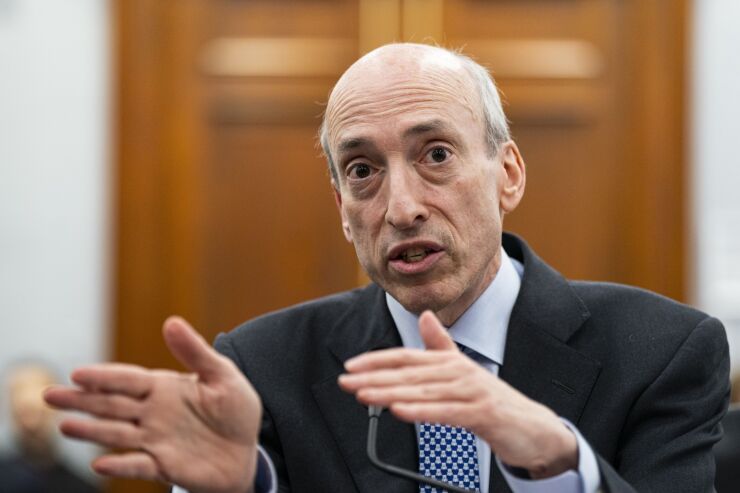
WASHINGTON — Securities and Exchange Commission Chairman Gary Gensler tied together cryptocurrencies and
"Silvergate and Signature [banks] were engaged in the crypto business — I mean some would say that they were crypto-backed," Gensler testified at a House Financial Services Committee hearing Tuesday.
The loss of deposits linked to cryptocurrency clients are widely believed to have contributed to Silvergate's decision to close and the failure of Signature. Federal regulators took unusual steps to try to prevent a loss of public confidence in the banking system after the collapse of those two banks and Silicon Valley Bank last month.
Gensler emphasized that the crisis showed that the regulated banking sector and the less-regulated crypto market have mutual exposures that have to be addressed.
"Silicon Valley Bank, actually when it failed, you saw the country's — the world's — second-leading stablecoin had $3 billion dollars involved there, depegged, so it's interesting just how this was all part of this crypto narrative as well."
The stablecoin company Circle has confirmed that it held
While the SEC has the authority it needs to police crypto market, Gensler says, the agency "could use more resources."
"The dedicated staff of this agency has done remarkable work with limited resources," Gensler said in his prepared remarks. "In the face of significant growth in registrants, more individual investor involvement in our markets, and increased complexity, the SEC's headcount actually shrunk from 2016 through last year. With Congress's help, our headcount this year now is approximately 3% larger than in 2016. I support the President's FY 2024 request of $2.436 billion, to put us on a better track for the future."
In its budget request, the SEC asked for funding for 5,475 new positions, some of which would increase the agency's oversight of crypto assets, including policing the market for noncompliant and fraudulent activity.
"I think this is a field that, in the main, is built up around noncompliance, and that's their business model," Gensler said at the hearing. "They have chosen to be noncompliant and not provide investors with confidence and protections, and it undermines the $100 trillion capital markets."
Gensler's appearance was his first before the committee since Republicans took control of the House in January. They had little to say on Gensler's call for more resources.
But Rep. Patrick McHenry, R-N.C., the chairman of the panel, has said that he intends to scrutinize the SEC and Gensler's leadership of the agency as part of an aggressive oversight agenda.
"As you can see, we're under new management and a new Congress," McHenry said. "So please get comfortable."
McHenry suggested he would use the committee's subpoena power or other methods to get information that Republicans say the SEC has withheld from Congress.
"If you continue to thwart this institution by ignoring our requests and providing incomplete responses, we will be left with no choice but to pursue all avenues to compel the information or documents we need," he said.
Republicans criticized what they called uncertainty over whether crypto assets should be classified as a security or a commodity, as well as the agency's proposed rulemaking around climate risk disclosures. The plan would include what's called a Scope 3 requirement, which might present a
Regarding the failed Silicon Valley and Signature banks, Gensler said that the SEC has "initiated discussions"
"I'm committed to getting this done," Gensler said.
Rep. Andy Barr, R-Ky., the chairman of the subcommittee on financial institutions, questioned Gensler
"I'm actually quite proud of the staff that put out that staff accounting bulletin, because what they said was public companies, not just banks, needed to put on their balance sheet their customers' crypto, because what we found in bankruptcy court, Celsius bankruptcy and others, in bankruptcy investors just stand in line," Gensler said.
When Barr asked if bank regulators were consulted beforehand, Gensler said that the agency discussed the issue with them "subsequently."
"There was significant dialogue beforehand with the accounting profession and the big four [accounting firms] and others, because this question kept coming up, but there has been consultation about this with the bank regulators subsequently," he said.





